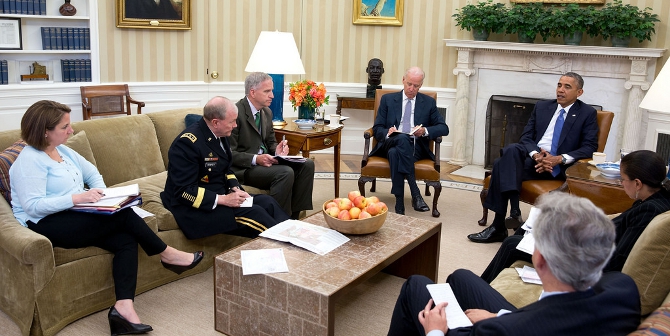 More than two years after the U.S. pulled its last remaining combat troops out of Iraq, the Obama administration is now confronted with the question of how to respond to the renewed sectarian violence of the Islamic State of Iraq and al-Shams (ISIS). Kristian Coates Ulrichsen argues that the present crisis in Iraq needs to be seen in the context of the consolidation of power of Iraqi Prime Minister Nuri al-Maliki since 2006, who has alienated much of Iraqi society through an increasingly majoritarian rule. He also warns that there is a distinct chance that any further U.S. arms introduced into the conflict may end up in the hands of ISIS or be used by the government to crack down on political opposition.
More than two years after the U.S. pulled its last remaining combat troops out of Iraq, the Obama administration is now confronted with the question of how to respond to the renewed sectarian violence of the Islamic State of Iraq and al-Shams (ISIS). Kristian Coates Ulrichsen argues that the present crisis in Iraq needs to be seen in the context of the consolidation of power of Iraqi Prime Minister Nuri al-Maliki since 2006, who has alienated much of Iraqi society through an increasingly majoritarian rule. He also warns that there is a distinct chance that any further U.S. arms introduced into the conflict may end up in the hands of ISIS or be used by the government to crack down on political opposition.
The lightning advance in parts of Iraq by the Islamic State of Iraq and al-Shams (ISIS) illustrates the complexity of the political and foreign policy dilemmas facing the Obama administration. Nine months after the tortuous deliberations over whether to launch air strikes against the Syrian regime in September 2013, the administration again confronts the question of how to respond to fast-developing events that defy clean or simple resolution. As Iraq’s post-occupation political settlement threatens to unravel, US policymakers find themselves constrained by the legacies of past actions and caught between conflicting regional interests.
Attempts by Dick Cheney, Tony Blair and L. Paul Bremer to distance themselves from current developments mask the unpalatable collapse of the political and security arrangements laid down after US-led forces toppled Saddam Hussein in 2003. The ethno-sectarian character of Iraqi politics and subsequent consolidation of power and authority under Prime Minister Nuri al-Maliki reflect the outcome of decisions made from the 2004 transitional administrative law which transferred authority from the Coalition Provisional Authority to the newly sovereign Iraqi government. Since taking power in 2006 and particularly since retaining it after the inconclusive 2010 election, Maliki has outwitted political rivals, extended control over the judiciary and security services, and alienated critical segments of Iraqi society through his majoritarian rule.
US statements of support for Maliki are tempered by rising awareness of his authoritarian power grab. Maliki nevertheless can point to the fact that in the recent parliamentary elections held in Iraq on April 30, his State of Law coalition increased its number of seats from 89 to 94 and emerged as the clear winner in a fragmented political landscape. American misgivings about the lack of power-sharing in a third Maliki term led to suggestions that continuing US aid be made contingent upon tangible progress on vaguely-specified national reconciliation initiatives. With Maliki engaged in an existential struggle for survival as he simultaneously prepares for the long process of negotiating a new governing coalition, any hope for greater political pluralism and distribution of power look bleak.

Of perhaps more concern to US policymakers are the reports from Mosul that the Iraqi army simply abandoned their positions in the face of a much smaller ISIS force. Since 2005, the value of sales of US military equipment to Iraq has exceeded US$14 billion, including major new agreements worth more than US$4 billion in 2013 alone. These transfers have not only failed to prevent or contain the advance of ISIS in recent weeks but also raise the possibility that sophisticated weaponry may fall into the hands of an organization too extreme even for Al-Qaeda. With Iraq lurching back into civil war, the prospect that US arms will be used against internal threats injects new considerations into their supply to a regime with a decidedly mixed record on human rights and good governance.
Officials in Washington, DC therefore must balance the need to assist the Iraqi government and security forces against awareness that such support could be used in a wider campaign of repressive crackdown on political opposition in Iraq. This happened in Yemen in 2010 when US security assistance doubled after the failed Christmas Day 2009 airline bombing in Detroit. Leaked diplomatic cables later revealed that a US-trained and funded counterterrorism unit that was intended to target Al-Qaeda in the Arabian Peninsula was redeployed against Houthi rebels battling Yemeni government forces in the northwest of the country. With Yemeni President Ali Abdullah Saleh ousted by a combination of mass protests and elite defections less than a year later, any prioritization of counterterrorism support to Iraq should come with acknowledgement that Maliki may similarly be as much a part of the problem as the solution.
If the US political response is challenging then the regional dimension is even more so. Triangulating a response that meets any form of lowest common denominator among America’s Gulf allies, Iran, and US political may well be impossible. Once again, there are no easy answers. The Gulf States have long detested Maliki’s rule in Iraq and have spent the past three years overtly and covertly supporting varying Islamist opposition groups in Syria. Gulf schadenfreude at the mounting Sunni insurgency against Maliki will be tempered with alarm at the signs that the crisis may draw Iran and the US into closer dialogue just as the nuclear negotiations in Geneva reach their conclusion. Officials in Israel, long the bedrock of US political and security policy in the Middle East, will share with the Republican and many Democrats similar opposition to any substantive coordination of policy with Iran. And yet, the collapse of the deeply-flawed post-2003 settlement that manifestly failed to stabilize Iraq provides an opportunity to at least acknowledge, if not explore, ways of bringing Iran back into the fold as a responsible regional actor.
Faced with the dizzying pace of events and no clear consensus about how to respond to the collapse of more than a decade of flawed policies toward Iraq, it is not surprising that the administration has proceeded with caution. The phrase ‘leading from behind’ may have attracted criticism from advocates of a more muscular projection of US power, but in light of the backstory of US involvement in shaping Iraq’s underwhelming post-war dynamics, doing less in terms of direct or hasty military action and more in terms of coordination with regional and international actors, is likely the best, or the least worst, way forward.
Please read our comments policy before commenting.
Note: This article gives the views of the author, and not the position of USApp– American Politics and Policy, nor of the London School of Economics.
Shortened URL for this post: http://bit.ly/1iKtQzK
_________________________________
 Kristian Coates Ulrichsen – Rice University
Kristian Coates Ulrichsen – Rice University
Kristian Coates Ulrichsen is a Research Fellow at Rice University’s Baker Institute for Public Policy, an Associate Fellow at Chatham House, and a Visiting Fellow at the LSE Middle East Centre. His research focuses on the political economy and regional security dynamics of the Gulf and Arabian Peninsula. His forthcoming book, Qatar and the Arab Spring, will be published in October 2014.






